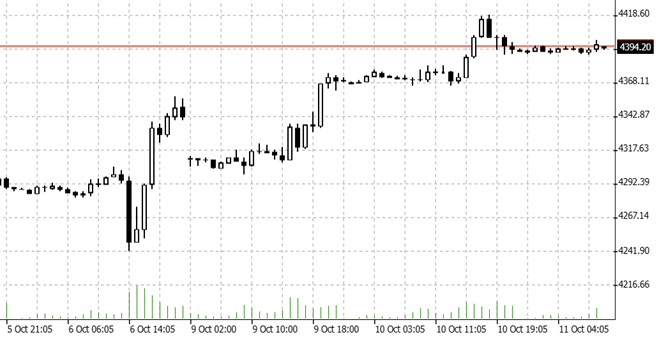

11.10.2023 – The stock market is catching its breath: While the world is watching the further developments in Israel and the Gaza Strip with bated breath, share prices have risen. The reasons for this: above all conciliatory tones from the Federal Reserve. And hope for government support in China.
Is this the calm before the storm? Or is the stock market assuming that the Gaza war will not turn into a conflagration after all? We shall see. The picture shows the hourly chart of the S&P 500.

Source: Bernstein Bank GmbH
First of all, stock prices rose because major addresses closed their short positions. “Short covering was the dominant driver of price action today,” Goldman Sachs judged yesterday.
Hope for a pause in interest rates
Finally, the Fed smoothed the waters. For example, Raphael Bostic, head of the Atlanta Fed, commented, “I don’t think we need to increase interest rates anymore, and I think that our policy rate is at a sufficiently restrictive position to get inflation down to 2%.” Mary C. Daly, head of the Federal Reserve Bank of San Francisco, judged that U.S. Treasury yields could have the same effect as a rate hike. Nick Timiraos, chief economics correspondent for The Wall Street Journal, who is considered a Fed mouthpiece, asserted that higher bond yields could probably extend the central bank’s pause on interest rates.
Neel Kashkari, president of the Federal Reserve Bank Minneapolis, said inflation is on the way down; moreover, the recent rise in U.S. government bond yields may take some work off the central bank. However, he said, yields have probably climbed because investors expect more action from the Fed – and indeed, the central bank could continue tightening if the economy shows continued strength. Meanwhile, Federal Reserve Governor Christopher Waller commented that the Fed remains on track to meet its 2 percent inflation target.
In addition, prices rose in Asia as hopes for a stimulus in China persist. Specifically, investors expect Beijing to boost domestic consumption.
It’s not over yet
Needless to say, traders need to keep a close eye on the fragile situation in Israel. Yesterday, for example, the indexes set back from their daily highs when news hit the ticker that Hezbollah had attacked an Israeli tank with missiles. Meanwhile, Washington sent a second aircraft carrier toward Israel. But just now, National Review rightly asked why Joe Biden had not given Hamas an ultimatum to release the American hostages in Gaza within 24 hours.
The answer is appeasement. For both Biden and Barack Obama have made Iran and its henchmen strong with their appeasement and have allowed Iran to arguably already possess a nuclear bomb. Just recently, the White House unfroze six billion dollars for Tehran in a hostage deal. I wonder where that money ends up!
Appeasement Brings War
Moreover, right at the beginning of his term, Biden has resumed the aid to terrorists that was cut off by Donald Trump. As “The Federalist” noted, Biden transferred some $316 million to Hamas and Fatah in 2022 alone. Germany and the European Union have also supported terror with billions. They have also allowed enemies of the West such as Hamas, Hezbollah, Gray Wolves, Milli Görus, and so on and so forth to feel comfortable in this country.
Why is all this important? Because appeasement always leads to a big war. In this sense: Soon the ground offensive of the Israelis in Gaza should start. Hezbollah – which, by the way, uses the Hitler salute – has threatened an attack on Israel in that event. And also attacks on American targets if the U.S. intervenes. So it remains exciting. Bernstein Bank wishes cool heads and successful trades!
___________________________________________________________________________________________________________________________________________________________
The content of this publication is for general information purposes only. In this context, it is neither an individual investment recommendation or advice nor an offer to purchase or sell securities or other financial products. The content in question and all the information contained therein do not in any way replace individual investor- or investment-oriented advice. No reliable forecast or indication for the future is possible with respect to any presentation or information on the present or past performance of the relevant underlying assets. All information and data presented in this publication are based on reliable sources. However, Bernstein Bank does not guarantee that the information and data contained in this publication is up-to-date, correct and complete. Securities traded on the financial markets are subject to price fluctuations. A contract for difference (CFD) is also a financial instrument with leverage effect. Against this backdrop, CFD trading involves a high risk up to the point of total loss and may not be suitable for all investors. Therefore, make sure that you have fully understood all the correlating risks. If necessary, ask for independent advice. CFDs are complex instruments and are associated with the high risk of losing money quickly because of the leverage effect. 68% of retail investor accounts lose money trading CFD with this provider. You should consider whether you understand how CFD work and whether you can afford to take the high risk of losing your money.7
